republic onboarding
Internet Banking
-
Savings & Chequing
-
Savings Accounts
Growing up with a plan for tomorrow
For youths between the ages 13 to 19 years
Shape your future
Helps you to build your nest egg
Saves you time and money
The wise investment instrument
Earn more on your Foreign Accounts
Chequing Accounts
Bank FREE, easy and convenient
A world of convenience and flexibity
Invest and enjoy the best of both worlds
A value package designed for persons 60 +
Life Stage Packages
Banking on your terms
Getting married?
Tools & Guides
Make an informed decision using our calculators
Help choose the account that’s right for you
All Our Cheques Have A New Look!
-
-
Electronic Banking
-
EBS Products
Open a deposit account online
Pay bills and manage your accounts easily
Banking on the Go!
Welcome to the Cashless Experience
Top up your phone/friend’s phone or pay utility bills for FREE!
EBS Products
Make secure deposits and bill payments
Access your accounts easily and securely with the convenience of Chip and PIN technology and contactless transactions.
Access cash and manage your money
Where your change adds up
-
-
Credit cards
-
Credit Cards
Credit Cards
Additional Information
-
-
Prepaid Cards
-
Pre-paid Cards
-
-
Loans
-
overview
To take you through each stage of life, as we aim to assist you with the funds you need for the things you want to do
We make it easy to acquire financial assistance for tertiary education through the Higher Education Loan Programme
We make it easy, quick and affordable to buy the car of your dreams
Tools & Guides
Helps you determine the loan amount that you can afford
You can calculate your business’ potential borrowing repayments
Republic Bank's Group Life Insurance will provide relief to your family by repaying your outstanding mortgage, retail or credit card balance in the event of death or disablement.
-
-
Mortgages
-
Mortgage Centre
Republic Bank Limited can make your dream of a new home a quick and affordable reality
New Customers
Block for MM- new user mortgage process
There are three stages you must complete before owning your first home
Tools & Guides
block for MM - personal - mortgages
-
-
Investments
-
Investment Products
-
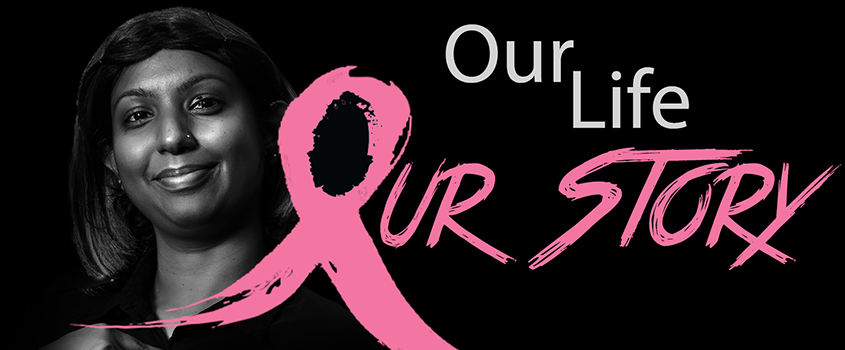
When Vikki Ramdass received the news that she had breast cancer, she began to cry.
“Why am I going through this? I was doing so well. I try my best to be a good person. Why am I going through this difficult journey?”
At age 33, Vikki Ramdass was at her peak in life. A holder of a BSC in Accounting, an MBA, and a PHD candidate, Vikki had her sights set on migrating, getting married and settling into her new life abroad.
“Before the cancer diagnosis, I was living a happy life. I loved volunteer work. In my spare time, I would spend time with my family and work with different organisations. I even went abroad to work with Caribbean Project.” But in late 2018, Vikki received news that would set her life in a new direction, forever.
One morning, while Vikki was getting dressed for work, she felt a lump in her breast.
“It was a strange coincidence because on Sunday, I prayed for good health and on Monday while getting dressed for work, I did a self-examination – I normally do self-examinations because cancer runs in my family – so I did it and I felt a hard, little lump.”
Vikki began to panic but remained grounded in her faith. She sought counsel from her coworkers, did her own research, and one week later, attended a Breast Cancer walk with a friend. While there, she was offered a free screening by the Trinidad and Tobago Cancer Society (TTCS) and did a physical breast examination that gave credibility to her suspicion. Upon the advice from the attending nurse, she scheduled an ultrasound with the TTCS.
As stated on the TTCS’ website, “For most ultrasound exams, the patient lies face-up on the examination table. A clear gel is applied to the area being examined. The gel allows the transducer to have ideal contact with the body by eliminating all air pockets. The physician will then firmly press the transducer against the skin and slowly move it around the area of interest. After the ultrasound scanning is complete, the gel will be wiped off the patient’s skin and the patient can leave. In some ultrasound exams, physicians insert the transducer inside the body to obtain useful results. In these cases, the transducer is attached to a probe and then placed into one of the body’s openings. For example, a transesophageal echocardiogram is taken by placing the transducer into the esophagus to get an image of the heart. A transrectal ultrasound involves placing the transducer into a man’s rectum to obtain images of the prostate. In a transvaginal ultrasound, the transducer is inserted into a woman’s vagina to view the uterus and ovaries.”
With a high-risk family history resulting in potentially inherited cancer genes, Vikki wrestled with the possibility of being diagnosed at that age but continued repeating her mantra – “You got this, Vikki.” Two weeks later, she scheduled a mammogram as advised. When her results came back, she was instructed to do a biopsy.
“I should’ve taken the advice and brought someone with me, but I felt as though I was ok – ‘I got this’. Although I knew it [the lump] was there, I felt as if it shouldn’t have been there, you know?”
The attending doctor sat Vikki down with her results from the three procedures she underwent and revealed that she had Stage 1 breast cancer.
“It was shocking. I felt as if it was so small and so tiny, I didn’t see the need to have cancer at that age.”
Vikki began to cry. Vikki questioned herself. She questioned the diagnosis. She questioned why she was the one being given this trial to bear.
“At that point, I realized I shouldn’t feel as if I was exempt from it because cancer is something that can affect anybody.”
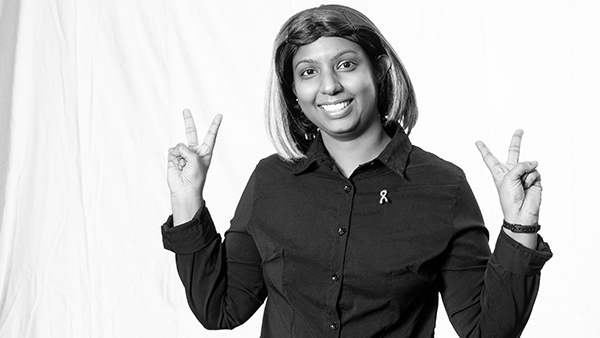
Vikki was advised to do a double mastectomy and offered counselling. She didn’t believe in undergoing a double mastectomy and sought a second opinion from doctors abroad, where she learned that she was not only diagnosed with breast cancer, but she was diagnosed with a rare, aggressive cancer type with limited treatment options – Triple-negative breast cancer (TNBC).
She returned to Trinidad, still in shock and a state of panic but ready to follow the advice of the doctors. Though the double mastectomy was recommended, Vikki refused.
“As a woman, it takes a piece out of you, you know. It’s hard, mentally. I had to go for pre-counselling.”
Vikki opted for a lumpectomy instead.
“The surgery was pretty scary. I didn’t know what to expect. I cried. I got up in pain and I cried again. Just going through that alone and being there alone, it hit me, and I started to cry again. I thought ‘oh gosh! Everyone is going to think I’m a cry baby’.”
One month, post-surgery, in January 2019, Vikki underwent eight rounds of chemotherapy.
“When I saw the red thing [chemotherapy drug] coming through the tube and entering my body, I panicked. I went home that day feeling really sick. When I got up the next morning and saw all my hair on my pillow, I lost it. Women look after their hair and their beauty, and to see all my hair gone? It was tough. Really tough, mentally.”
Despite having a positive outlook on her diagnosis, Vikki wrestled with the idea of cancelling her treatment options or continuing her treatment amid the side effects.
“At that point, I told myself that there was no need to continue. I had lost all my hair, I’m extremely sick, the survival rate is low. What is the need?”
Vikki stopped seeking chemotherapy for one month.
According to the Trinidad and Tobago Cancer Society’s Chairman, Dr. Asante Le Blanc, refusal to commence or continue treatment based on fear and other reasons, is a natural and raw emotion that most cancer patients experience. “There is a small minority of patients who refuse treatment and that may be based on a number of reasons. As medical professionals, our job is to discuss all the options with our patients whether those options include recommencing treatment or seeking palliative care. This is why we encourage routine screenings and partner with various organisations like Republic Bank and others to get the word out. Getting screened early and routinely can really help with those tough decisions before it’s too late.”
One month later, Vikki’s doctors recommended a lower dosage of the drug and she agreed to continue chemotherapy. Vikki finished chemotherapy treatment in September 2019. Thereafter, her radiation journey began at the age of 34.
“Spending all this time at home, I needed to do something, so I did my own research on how other patients and survivors got through this. I started journaling. I didn’t want to be a burden on anyone, so I’d journal emotions.”
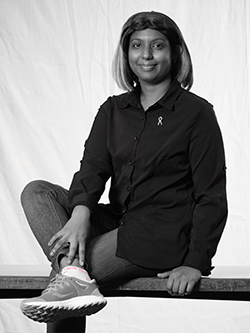
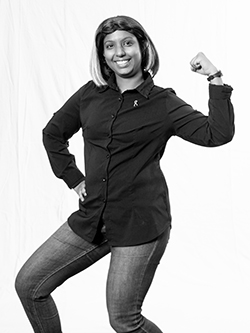
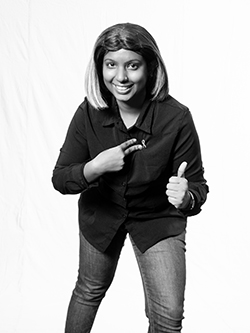
“In the beginning, I didn’t want to tell anyone about my diagnosis because I felt embarrassed, but times are different now. I have more exposure to research and technology. Now I’m 35 and supposedly cancer free, but there’s still a struggle. I have ‘scanxiety’. Every time I go for a scan, I think ‘oh gosh, what now?’ I even reached to a point where I didn’t want to see another needle.”
Now, 35, Vikki is cancer free and aptly describes herself as courageous – Courageous Vikki. A volunteer at heart, Vikki shares her story with the hope that it’ll inspire change in the minds of many, regarding lifestyle diseases.
“Cancer has beauty in it. The beauty is that it develops an inner strength to find out your purpose. Looking back at it now, I can’t believe I went through that.”
Vikki Ramdass
Survivor since 2019
Event Calendar
- SellReady Launches Digital Property Transaction Platform With Republic Bank Limited
- Republic Financial Holdings Limited Surpasses US$200 Million Climate Finance Target
- Zebapique Productions Junior Carnival Band Celebrates 20 Years of Mas and a Decade of Partnership with Republic Bank
- Republic Cup National Youth Football League on Hiatus until 2027
COMPANY INFORMATION
Banking Segments
Press & Media
Contact Us
© 2026 Republic Bank Limited. All Rights reserved.








